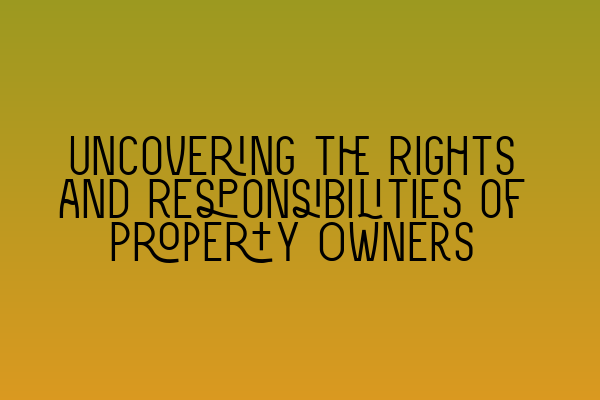Uncovering the Rights and Responsibilities of Property Owners
As professional property solicitors at SQE Property Law & Land Law, we understand the importance of knowing your rights and responsibilities as a property owner. Whether you are a homeowner, a landlord, or a tenant, being aware of what you can and cannot do with your property is crucial for both legal compliance and peace of mind.
In this comprehensive guide, we will explore the various rights and responsibilities that property owners have, helping you navigate the often complex world of property law. So, let’s dive in and uncover the key aspects you need to know!
1. Ownership Rights:
First and foremost, property owners have the right to exclusive possession and use of their property. This means that you have the authority to control who enters your property and how it is used. However, it’s important to note that certain rights, such as the right to privacy and the right to repair, also come with responsibilities, which we will discuss later in this article.
To understand your ownership rights in more detail, we recommend checking out our related article on SQE 1 Practice Exam Questions.
2. Responsibilities towards Tenants:
If you are a landlord, it’s crucial to understand your responsibilities towards your tenants. These responsibilities typically include providing a safe and habitable living environment, performing necessary repairs, and respecting the privacy of your tenants. Additionally, landlords have the right to collect rent and set reasonable rules for the property.
To learn more about landlord-tenant relationships and how to navigate them effectively, we suggest reading our article on SQE 1 Practice Mocks FLK1 FLK2.
3. Responsibilities towards the Community:
Property owners also have responsibilities towards the community in which their property is located. These responsibilities mainly involve complying with local laws and regulations, such as obtaining necessary permits for renovations and ensuring that the property meets health and safety standards. Failure to fulfill these responsibilities may result in legal consequences and potential penalties.
For comprehensive guidance on community responsibilities, take a look at our SQE 2 Preparation Courses article.
4. Financial Responsibilities:
Owning a property also comes with financial responsibilities, such as paying property taxes, insurance premiums, and mortgage payments (if applicable). It’s essential to stay on top of these financial obligations to avoid any legal and financial repercussions.
To gain a better understanding of the financial aspects of property ownership, we recommend exploring our SQE 1 Preparation Courses article.
5. Responsibilities towards Neighbors:
Property owners have a duty to respect and maintain harmonious relationships with their neighbors. This includes avoiding activities that may disrupt the peace, such as excessive noise, and addressing any issues or disputes that may arise promptly and amicably. Good neighborly relationships contribute to a positive living environment for everyone involved.
For more information on how to maintain good relationships with your neighbors, check out our article on SRA SQE Exam Dates.
In Conclusion:
Understanding the rights and responsibilities of property owners is vital for a smooth and lawful ownership experience. By familiarizing yourself with these key aspects, you can make informed decisions and ensure that you are fulfilling your legal obligations as a property owner.
At SQE Property Law & Land Law, we are committed to providing expert legal advice and assistance for all property-related matters. If you have any questions or require professional assistance, please don’t hesitate to reach out to our team of experienced solicitors.
Disclaimer: This blog post is intended for informational purposes only and should not be taken as legal advice. The contents of this article may vary depending on the specific jurisdiction. It is always recommended to consult with a qualified legal professional for personalized advice.
